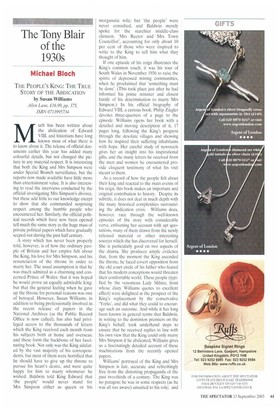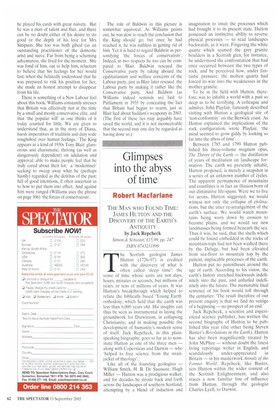The Tony Blair of the 1930s
Michael Bloch
THE PEOPLE'S KING: THE TRUE STORY OF THE ABDICATION by Susan Williams Allen Lane, £16.99, pp. 375, ISBN 0713995734 Much has been written about the abdication of Edward VIII, and historians have long known most of what there is to know about it. The release of official documents earlier this year has added many colourful details, but not changed the picture in any material respect. It is interesting that both the King and Mrs Simpson were under Special Branch surveillance, but the reports now made available have little more than entertainment value. It is also interesting to read the interviews conducted by the official investigating Mrs Simpson's divorce, but these add little to our knowledge except to show that she commanded surprising respect among the humble people who encountered her. Similarly, the official political records which have now been opened tell much the same story as the huge mass of private political papers which have gradually seeped out during the past half century.
A story which has never been properly told, however, is of how the ordinary people of Britain and her empire felt about the King, his love for Mrs Simpson, and his renunciation of the throne in order to marry her. The usual assumption is that he was much admired as a charming and concerned Prince of Wales; that it was hoped he would prove an equally admirable king; but that the general feeling when he gave up the throne for personal reasons was one of betrayal. However, Susan Williams, in addition to being professionally involved in the recent release of papers in the National Archives (as the Public Record Office is now called), has also had privileged access to the thousands of letters which the King received each month from his subjects both at home and overseas; and these form the backbone of her fascinating book. Not only was the King adulated by the vast majority of his correspondents, but most of them were horrified that he should have to give up the throne to pursue his heart's desire, and were quite happy for him to marry whomever he wished. Baldwin told King Edward that the people' would never stand for Mrs Simpson either as queen or his morganatic wife; but 'the people' were never consulted, and Baldwin merely spoke for the starchier middle-class element. 'Mrs Rector and Mrs Town Councillor', accounting for only about 10 per cent of those who were inspired to write to the King to tell him what they thought of him.
If one episode of his reign illustrates the King's common touch, it was his tour of South Wales in November 1936 to raise the spirits of depressed mining communities, when he proclaimed that 'something must be done'. (This took place just after he had informed his prime minister and closest family of his determination to marry Mrs Simpson.) In his official biography of Edward VIII, a curious book, Philip Ziegler devotes three-quarters of a page to the episode. Williams opens her book with a detailed and moving description of it, 17 pages long, following the King's progress through the desolate villages and showing how he inspired their suffering inhabitants with hope. Her careful study of newsreels gives her an insight into his inspirational gifts, and the many letters he received from the men and women he encountered provide eloquent testimony of what his visit meant to them.
As a record of how the people felt about their king and reacted to the main events of his reign, this book makes an important and original contribution to history. Despite its subtitle, it does not deal in much depth with the many historical complexities surrounding the abdication crisis. Williams does, however, race through the well-known episodes of the story with considerable verve, enlivening her account with apt quotations, many of them drawn from the newly released material or other interesting sources which she has discovered for herself. She is particularly good on two aspects of the drama, She produces ample evidence that, from the moment the King ascended the throne, he faced covert opposition from the old court circle of his father who feared that his modern conceptions would threaten their comfortable world. These people (typified by the venomous Lady Milner, from whose diary Williams quotes to excellent effect) were delighted at the prospect of the King's replacement by the conservative 'Yorks', and did what they could to encourage such an outcome. And while it has long been known in general terms that Baldwin, in writing to the dominion premiers on the King's behalf, took underhand steps to ensure that he received replies in line with his own view that the King could only marry Mrs Simpson if he abdicated, Williams gives us a fascinatingly detailed account of these machinations from the recently opened papers.
Williams' portrayal of the King and Mrs Simpson is fair, accurate and refreshingly free from the distorting propaganda of the past two-thirds of a century, The King was no paragon; he was in some respects (as he was all too aware) unsuited to his role; and he played his cards with great naivety. But he was a man of talent and flair, and there can be no doubt either of his desire to do good or the depth of his love for Mrs Simpson. She too was both gifted (as an outstanding practitioner of the domestic arts) and naive. Far from being a scheming adventuress, she lived for the moment. She was fond of him, out to help him, reluctant to believe that his feelings for her would last; when she belatedly understood that he was prepared to risk his position for her, she made an honest attempt to disappear from his life.
There is something of a New Labour feel about this book. Williams constantly stresses that Britain was effectively run at the time by a small and mostly conservative elite, and that 'the popular will' as one thinks of it today counted for little. We are given to understand that, as in the story of Diana, harsh imperatives of tradition and duty rode roughshod over human feelings. The King appears as a kind of 1930s Tony Blair: glamorous and charismatic; thriving (as well as dangerously dependent) on adulation and approval; able to make people feel that he truly cared about their lot: a 'moderniser' seeking to sweep away what he (perhaps hastily) regarded as the detritus of the past; full of good intentions, if often uncertain as to how to put them into effect. And against him were ranged (Williams uses the phrase on page 106) 'the forces of conservatism'. The role of Baldwin in this picture is somewhat equivocal. As Williams points out, he was slow to reach the conclusion that the King should go: but once he had reached it, he was ruthless in getting rid of him. Yet it is hard to regard Baldwin as personifying 'the forces of conservatism'. Indeed, in two respects he too can be compared to Blair. Baldwin rescued the Conservative party by taking aboard the egalitarianism and welfare concerns of the Labour party, just as Blair later rescued the Labour party by making it rather like the Conservative party. And Baldwin (as Williams indeed reminds us) lied to Parliament in 1935 by concealing the fact that Britain had begun to rearm, just as Blair lied about Saddam's weaponry in 2003. (The first of these lies may arguably have saved the world, and it is not inconceivable that the second may one day be regarded as having done so.)



























































































 Previous page
Previous page